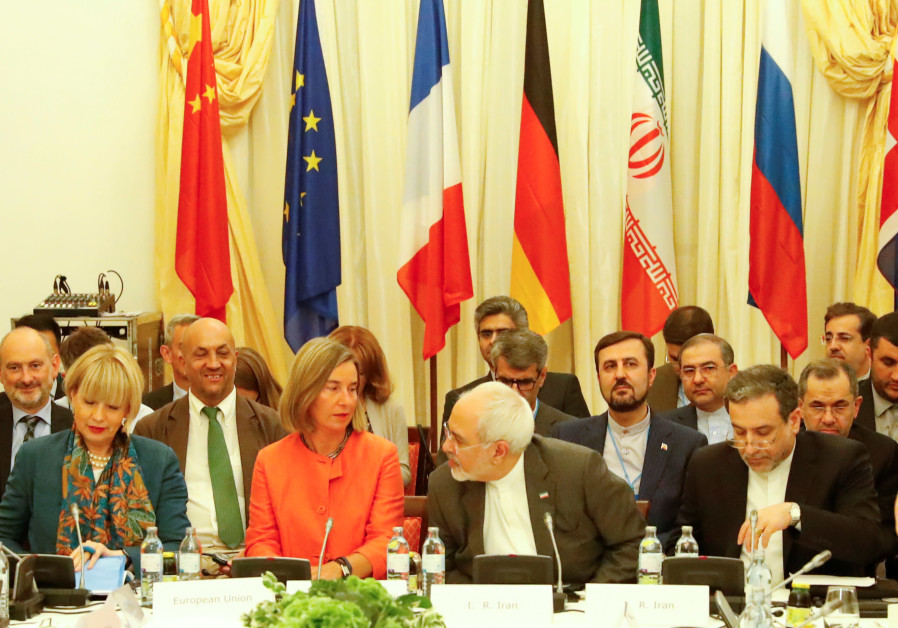Will EU’s scheme to beat U.S. sanctions against Iran be a game changer?

European Union High Representative for Foreign Affairs and Security Policy Federica Mogherini and Iran’s Foreign Minister Mohammad Javad Zarif attend a meeting in Vienna, Austria July 6, 2018. (photo credit: REUTERS/LEONHARD FOEGER)
France has announced that a European-backed system to enable non-dollar trade with Iran and circumvent US sanctions will finally be set up in the coming days.
Will the EU’s so-called special purpose vehicle (SPV) be a game-changer in the nuclear and sanctions standoffs between Iran and the US?
The EU’s concept of the SPV was to help match sanctioned Iranian oil and gas exports against purchases of EU goods, an effective barter arrangement.
When the Trump administration pulled out of the 2015 Iran nuclear deal in May and snapped various sanctions back on Iran in recent months, the Islamic Republic threatened to leave the deal as well.
Yet, Tehran has remained in the deal until now.
Observers broadly agree that Iran has stayed in the deal to maintain “the high ground” in any diplomatic conflict with the US, to split the US from its EU allies and to garner financial aid from the EU.
The question has been whether Tehran’s sticking with the deal was getting it any substantial economic relief or whether the EU’s promises of help to Iran were a paper tiger?
Put differently, would the EU’s help to Iran thwart the impact of US sanctions or are US sanctions too powerful for the EU’s aid to make a difference?
From May until now, the EU had failed to establish the SPV which would facilitate trade with Iran by having many countries working together to trade with Iran without using US dollars.
EU diplomats had said that though they wanted to help Iran, no single country wanted to be the host of the SPV and then face the full wrath of the US alone.
Recently, it was reported that England, France and Germany would each host aspects of the SPV so that no single country could be targeted by the US.
Yet until Thursday, EU officials had said that even if SPV launched this month, it would not actually operate for several months because technical details still need to be worked out.
It was unclear from Thursday’s announcement whether the actual operation of the SPV had been accelerated or whether it was just a symbolic announcement.
But until the EU proves otherwise, the SPV is not expected to make a huge difference.
Most EU companies toed the line with US sanctions months ago and pulled out of Iran, even as their governments plead with them to stay the course.
In addition, at a bird’s eye level, the Islamic Republic appears to be able to withstand US sanctions, with or without EU relief. This is because China, Russia, India, South Korea and several other non-EU countries are sticking with their business with Iran in the face of US sanctions or with a US waiver.
An interesting scenario where the EU could make a bigger difference might be if the US-China trade war resolves and part of the resolution includes China cutting back its business with Iran.
In that case, economic support from the EU could matter more to Tehran.
On the other end of the spectrum, the EU recently dressed down Iran for involvement in terror on the European continent, and the EU could use the SPV as a bargaining chip to get Iran to reform aspects of its behavior.
Still, the most likely scenario is that the EU will slowly roll out the SPV which will help Iran more on the public relations side than it will make a major economic difference.
The real question will be whether the EU will take Iran or the US’s side at a future crisis point or when the nuclear deal’s restrictions expire.
Reuters contributed to this report.
Join Jerusalem Post Premium Plus now for just $5 and upgrade your experience with an ads-free website and exclusive content. Click here>>






Comments are closed.